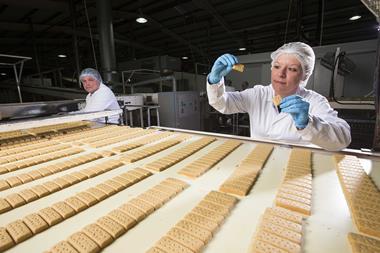The Food & Drink Federation has said government advice for businesses on a no-deal Brexit will have frightened many small and medium food businesses.
The government has today (23 August) published the first in a series of Technical Notices advising businesses and individuals how to prepare for a ‘no deal’ scenario.
In such circumstances, the UK would leave the EU on 11pm on 29 March next year without a withdrawal agreement and framework for a future relationship in place between the UK and the EU.
Speaking in London today, Brexit secretary Dominic Raab said that the government had plans to mitigate any risk of disruption to supply chains, and that the suggestion there would be a “sandwich famine” was misleading.
The first technical notes covered topics including producing and processing organic food, and specific importing and exporting matters (trade remedies; trading with the EU; classifying your goods in the UK trade tariff; and exporting controlled goods).
The notice about organic food certification made it clear that UK organic exporters could face a ban on exports to the EU for at least nine months after a no-deal exit, while new approvals for certification were sought, said the Food & Drink Federation (FDF).
And it warned the issues would also affect any UK food that currently displayed EU marks or logos.
“The government’s laudable decision to publish these Technical Notices nevertheless confirms what a grisly prospect for UK food and drink a no-deal exit from the EU would be,” said FDF chief executive Ian Wright.
He added there was no sign of further progress on negotiating frameworks with devolved administrations, and no substantive information on mitigating the impact of no-deal on the island of Ireland.
“Moreover, the UK food industry will doubt that the government could replace TRACES (the EU Trade Control and Expert System that tracks the entire trade and certification process for animals, food, feed and plants) with a new, comprehensive, functional UK alternative IT system in time for the end of March,” said Wright.
The FDF warned the new burdens potentially facing food and drink exporters and importers set out today would frighten many SME food businesses.
“The piecemeal release of these notices indicates that many are not yet ready and agreed for publication. That hardly inspires confidence. As the consequences of a no-deal exit from the EU become ever clearer it is vital that, to protect the interests of shoppers and consumers, the government must deliver a deal with the EU.”
The FDF’s words were echoed by the Soil Association, which said a no-deal Brexit would be the worst possible scenario for UK food and farming.
“The technical notices offer no further clarity to businesses and provide neither reassurance nor advice on how to prepare for a potential ‘no deal’ scenario,” added head of standards Chris Atkinson.
“The information outlined raises concerns that imports and exports to and from the EU may be held up for months. We are also concerned that a new UK-owned imports traceability system to replace the current EU system would need to be in place by 29 March 2019. In our view this is an unrealistic goal within the time frame. Delays could significantly hinder trade.”



































No comments yet